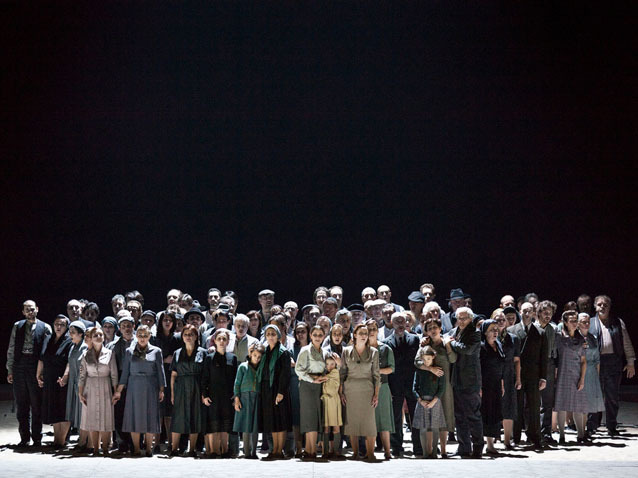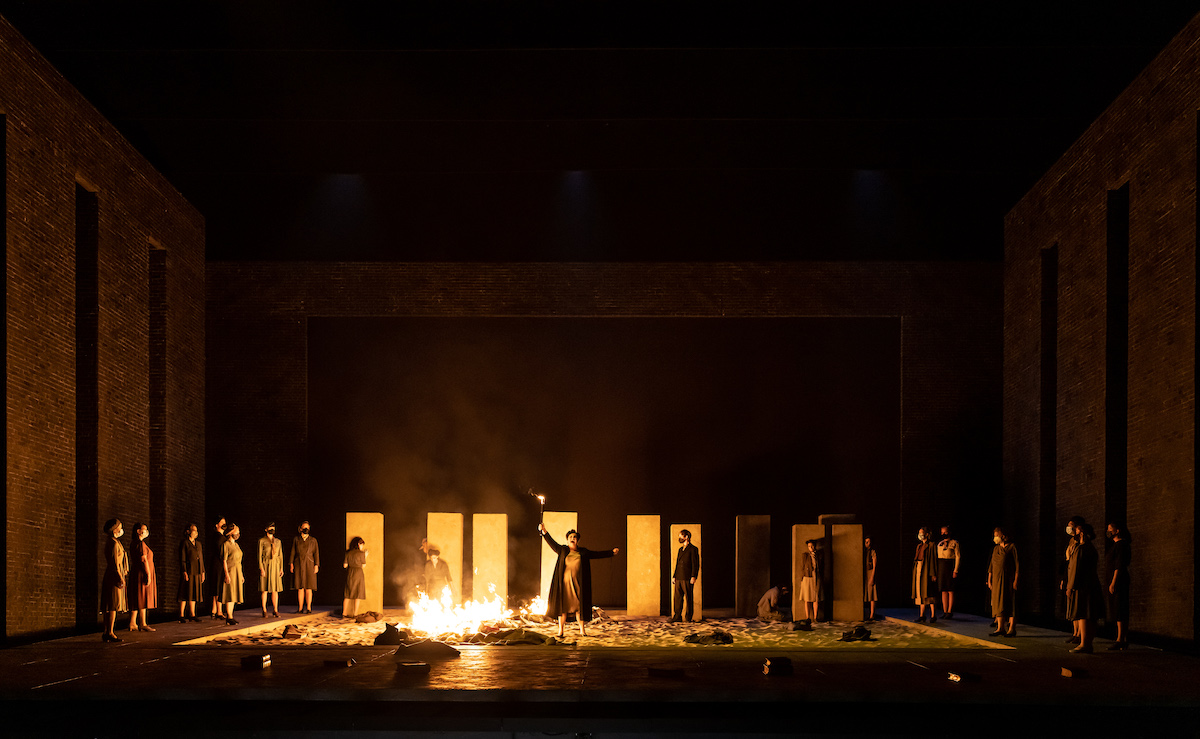Nabucco, Royal Opera review - high passion but low drama | reviews, news & interviews
Nabucco, Royal Opera review - high passion but low drama
Nabucco, Royal Opera review - high passion but low drama
Atmospheric but ambiguous production, given extra weight by cast of rich voices

This latest revival of the Royal Opera’s Nabucco production has suffered more than most from COVID disruptions. At the first night, on 20 December, the chorus were obliged to wear masks, news that was greeted by boos from the audience. Then the next two performances were cancelled.
This one did take place, but without conductor Daniel Oren or star soprano Anna Netrebko, the latter grounded by travel restrictions. But we got a performance, no doubt a relief in some quarters, as the occasion marked the 75th anniversary of the company.
The production, directed by Daniele Abbado, first appeared in 2013 (a co-production with La Scala), and this is its second revival. The setting is atmospheric but frustratingly ambiguous. The costumes could date from anywhere between the mid-19th century and the mid-20th. Tangential references are made to the Holocaust, the brutal treatment of the Jewish prisoners, bare redbrick walls around the stage. The Jerusalem set (designs by Alison Chitty) features grey standing stones, echoing the Holocaust memorial in Berlin, but as a photograph in the programme makes clear, the visual reference is to the tombs on the Mount of Olives. This suggestive setting provides atmosphere, but is no substitute for the action and dramaturgy required. When Nabucco (Amartuvshin Enkhbat) makes his entrance in the first act, Verdi gives him grand and lengthy processional music. But here he just walks on in a drab suit, and then has to shuffle around mid-stage waiting for the music to end. The chorus is choreographed more effectively, although the drab costumes make it difficult to distinguish Jews from Assyrians, and the sophisticated crowd movement highlights the more primitive Personenregie of the principals. The setting changes for the second half, as we move from Jerusalem to Babylon. The temple setting there is dominated by the idol of Baal, which takes the form of a huge figure in metal gauze, brought on in procession and assembled onstage. Again, the simple stage furniture complements the more sophisticated chorus movements.
This suggestive setting provides atmosphere, but is no substitute for the action and dramaturgy required. When Nabucco (Amartuvshin Enkhbat) makes his entrance in the first act, Verdi gives him grand and lengthy processional music. But here he just walks on in a drab suit, and then has to shuffle around mid-stage waiting for the music to end. The chorus is choreographed more effectively, although the drab costumes make it difficult to distinguish Jews from Assyrians, and the sophisticated crowd movement highlights the more primitive Personenregie of the principals. The setting changes for the second half, as we move from Jerusalem to Babylon. The temple setting there is dominated by the idol of Baal, which takes the form of a huge figure in metal gauze, brought on in procession and assembled onstage. Again, the simple stage furniture complements the more sophisticated chorus movements.
With or without Netrebko this was a predominantly Slavic cast, and so the singing was weighty and solid. The standout performance of the first act was Alexander Vinogradov as the prophet Zaccaria. He has a huge, deep voice and rich, velvety tone. The three main leads were less impressive. As Abigaille, Liudmyla Monastyrska is bright and clear, rich and secure in her low register, but thin and wobbly at the top. And her ornamented runs often sounded approximate. As her love rival, Fenena, Vasilisa Berzhanskaya brings a softer, more intimate tone, attractive but lacking in dramatic weight. So too Najmiddin Mavlyanov as her lover Ismaele, who sounds more Italian than most of the cast, but has too nasal a tone for this heroic tenor role.
Amartuvshin Enkhbat gives a slow-burn performance as Nabucco. In the first act, he is stiff and unconvincing. That is as much a fault of the production as the singer. His mad scene is underplayed and lacks credibility. But he saves the best for last: his fourth act aria, “Dio di Giuda”, as he releases the Jews and begs their forgiveness, was delivered with real passion and intensity. Standing in at short notice for Daniel Oren, conductor Renato Balsadonna gave a sprightly and energetic account of the score, and the late substitution didn’t occasion any excessive caution from him, the orchestra or singers. The chorus (now unmasked) sometimes sounded like they were expecting more detailed guidance, including in “Va Pensiero”, but otherwise shone, bringing richness of tone and valuable suppleness to the many tuttis. A serviceable, but not exceptional outing, then, for Verdi’s Nabucco, and, under the circumstances, a performance that we should be grateful happened at all.
Standing in at short notice for Daniel Oren, conductor Renato Balsadonna gave a sprightly and energetic account of the score, and the late substitution didn’t occasion any excessive caution from him, the orchestra or singers. The chorus (now unmasked) sometimes sounded like they were expecting more detailed guidance, including in “Va Pensiero”, but otherwise shone, bringing richness of tone and valuable suppleness to the many tuttis. A serviceable, but not exceptional outing, then, for Verdi’s Nabucco, and, under the circumstances, a performance that we should be grateful happened at all.
- Nabucco at the Royal Opera until 23 January. A live stream is also scheduled for 20 January.
- More opera reviews on theartsdesk
rating
Explore topics
Share this article
Add comment
The future of Arts Journalism
You can stop theartsdesk.com closing!
We urgently need financing to survive. Our fundraising drive has thus far raised £49,000 but we need to reach £100,000 or we will be forced to close. Please contribute here: https://gofund.me/c3f6033d
And if you can forward this information to anyone who might assist, we’d be grateful.

Subscribe to theartsdesk.com
Thank you for continuing to read our work on theartsdesk.com. For unlimited access to every article in its entirety, including our archive of more than 15,000 pieces, we're asking for £5 per month or £40 per year. We feel it's a very good deal, and hope you do too.
To take a subscription now simply click here.
And if you're looking for that extra gift for a friend or family member, why not treat them to a theartsdesk.com gift subscription?
more Opera
 Orpheus and Eurydice, Opera Queensland/SCO, Edinburgh International Festival 2025 review - dazzling, but distracting
Eye-popping acrobatics don’t always assist in Gluck’s quest for operatic truth
Orpheus and Eurydice, Opera Queensland/SCO, Edinburgh International Festival 2025 review - dazzling, but distracting
Eye-popping acrobatics don’t always assist in Gluck’s quest for operatic truth
 MARS, Irish National Opera review - silly space oddity with fun stretches
Cast, orchestra and production give Jennifer Walshe’s bold collage their all
MARS, Irish National Opera review - silly space oddity with fun stretches
Cast, orchestra and production give Jennifer Walshe’s bold collage their all
 Káťa Kabanová, Glyndebourne review - emotional concentration in a salle modulable
Janáček superbly done through or in spite of the symbolism
Káťa Kabanová, Glyndebourne review - emotional concentration in a salle modulable
Janáček superbly done through or in spite of the symbolism
 Buxton International Festival 2025 review - a lavish offering of smaller-scale work
Allison Cook stands out in a fascinating integrated double bill of Bernstein and Poulenc
Buxton International Festival 2025 review - a lavish offering of smaller-scale work
Allison Cook stands out in a fascinating integrated double bill of Bernstein and Poulenc
 Tosca, Clonter Opera review - beauty and integrity in miniature
Happy surprises and a convincing interpretation of Puccini for today
Tosca, Clonter Opera review - beauty and integrity in miniature
Happy surprises and a convincing interpretation of Puccini for today
 Hamlet, Buxton International Festival review - how to re-imagine re-imagined Shakespeare
Music comes first in very 19th century, very Romantic, very French operatic creation
Hamlet, Buxton International Festival review - how to re-imagine re-imagined Shakespeare
Music comes first in very 19th century, very Romantic, very French operatic creation
 Falstaff, Glyndebourne review - knockabout and nostalgia in postwar Windsor
A fat knight to remember, and snappy stagecraft, overcome some tedious waits
Falstaff, Glyndebourne review - knockabout and nostalgia in postwar Windsor
A fat knight to remember, and snappy stagecraft, overcome some tedious waits
 Salome, LSO, Pappano, Barbican review - a partnership in a million
Asmik Grigorian is vocal perfection in league with a great conductor and orchestra
Salome, LSO, Pappano, Barbican review - a partnership in a million
Asmik Grigorian is vocal perfection in league with a great conductor and orchestra
 Semele, Royal Opera review - unholy smoke
Style comes and goes in a justifiably dark treatment of Handelian myth
Semele, Royal Opera review - unholy smoke
Style comes and goes in a justifiably dark treatment of Handelian myth
 Le nozze di Figaro, Glyndebourne review - perceptive humanity in period setting
Mostly glorious cast, sharp ideas, fussy conducting
Le nozze di Figaro, Glyndebourne review - perceptive humanity in period setting
Mostly glorious cast, sharp ideas, fussy conducting
 Fidelio, Garsington Opera review - a battle of sunshine and shadows
Intimacy yields to spectacle as Beethoven's light of freedom triumphs
Fidelio, Garsington Opera review - a battle of sunshine and shadows
Intimacy yields to spectacle as Beethoven's light of freedom triumphs
 Dangerous Matter, RNCM, Manchester review - opera meets science in an 18th century tale
Big doses of history and didaction are injected into 50 minutes of music theatre
Dangerous Matter, RNCM, Manchester review - opera meets science in an 18th century tale
Big doses of history and didaction are injected into 50 minutes of music theatre

Comments
we went to the performance on